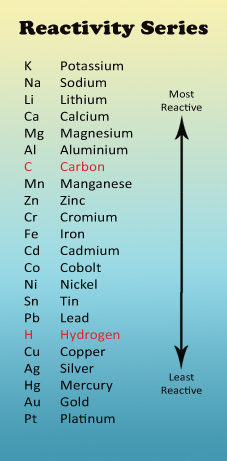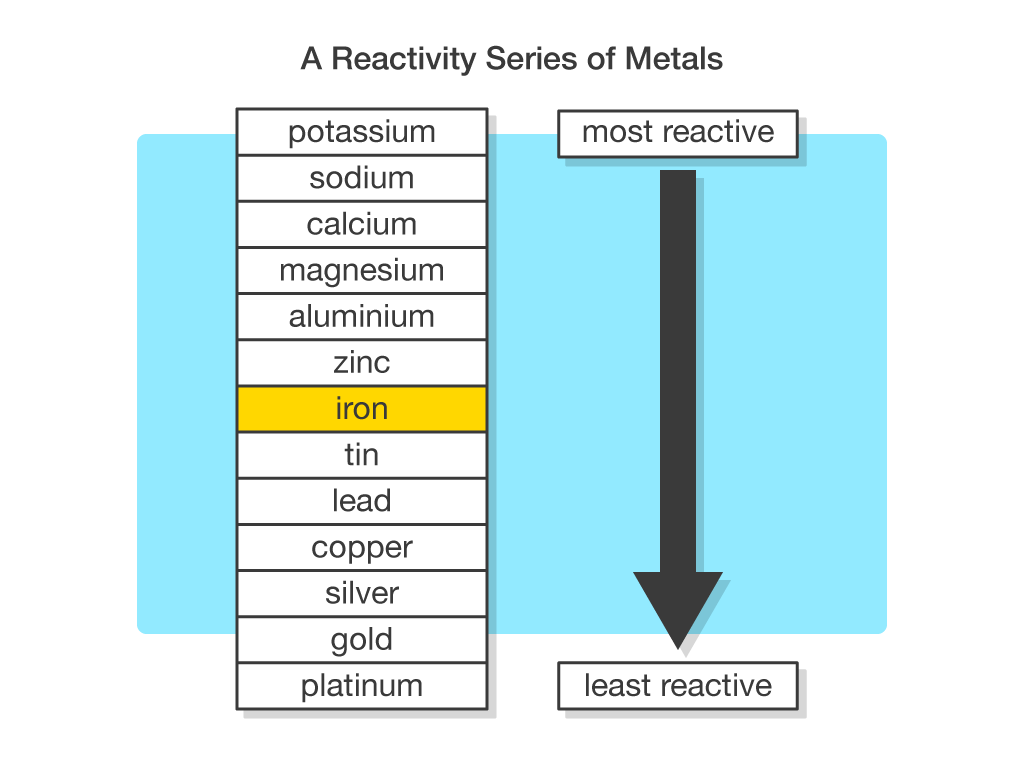Reactivity and extraction method The table displays some metals in decreasing order of reactivity and the methods used to extract them. The noble gasses for instance are usually quite stubborn and dont form compounds even in artificial environments.
Solder is more reactive than tin.
Is carbon more reactive than tin. The reactivity series allows us to predict how metals will react. 3 Metal E will not react with dilute acids. C zinc is more reactive than tin.
16 rows Some metals are more reactive than others. Buti dont know exactly why it is more reactive. This compound is soluble in water.
Stainless steel is more reactive than lead. Metals more reactive than carbon such as aluminium are. C zinc is more reactive than tin.
_PbO s _C s à _Pb l _CO. Zinc tin sulphate -- a zinc tin sulphate b zinc zinc sulphate c tin zinc sulphate d tin zinc chloride 11 Copper is more reactive than silver. This means that some metals can be extracted from their metal oxides using carbon.
It is an isotope. Reaction of tin with air. Sn Ni Co Cd Fe.
A more reactive metal will displace a less reactive metal from a compound. In this way how are metals below carbon extracted. Fairly reactive Aluminium Metal.
4 Metal H will NOT displace metal F from its sulfate salt solution. Tin is more reactive than germanium which is immediately above tin in the periodic table. 31 rows The most reactive metals such as sodium will react with cold water to produce hydrogen.
Hydrogen Not a metal but included. Sns O 2 g SnO 2 s. Lead is more reactive than solder.
Yes tin is more reactive than iron. Carbon can displace zinc because it is more reactive in the reactivity series. A zinc is costlier than tin.
The carbon gets oxidised so this is also a redox reaction. Fairly reactive Carbon Not a metal but included in series Zinc. If you were to look at a table of reactivities of metals you would see that in the case of Fe and Sn and the metals in between the series of increasing reactivities is.
Aluminum is a more chemically reactive metal than iron and thus should be less corrosion-resistant than steel. Given the following four observations of the reactions of four metals. 1 Metals F and G slowly react with water.
It will displace tin from a compound. Carbon with a mass of 14 is more reactive. An element reacts with oxygen to give a compound with a high melting point.
This works for zinc iron tin lead and copper. Very reactive Magnesium. Reaction of tin with water.
Silicon symbol Si is a group 14 metalloid. Tin is more. Use this fact to explain why tin has been used by humans for longer - For All Answers.
Carbon is a non-metal but it is more reactive than some metals. This works for zinc iron tin lead and copper. B zinc has a higher melting point than tin.
Rusting is an oxidation reaction. It is less reactive than its chemical analog carbon the nonmetal directly above it in the periodic table but more reactive than germanium the metalloid directly below it in the. Carbon steel is more reactive than stainless steel.
It depends on your formula chemistry. 2 Metal H will displace metal G form its chloride salt solution. And tin is more reactive than copper.
It is stable in air under ambient conditions but on heating in air or oygen tin reacts with oxygen to from tin dioxide SnO 2. What is the least reactive metal in Period 3. Choose the correct statement to complete this word equation.
A First of all carbon is more reactive than zinc iron tin and lead. This works because carbon is more reactive than lead so carbon can reduce the lead oxide to lead. Calcium electronegativity 100 is.
Aluminum is more reactive than carbon. Is zinc more reactive than calcium. Steel typically corrodes very rapidly when the solution formula pH is below approximately five.
Food cans are coated with tin and not with zinc because a Zinc is costlier than tin b Zinc has higher melting point than tin c Zinc is more reactive than tin d Zinc is less reactive than tin. Fairly reactive Iron Metal. Therefore carbon can easily reduce the oxide of these metals.
Is zinc more reactive than steel. But steel is more reactive than copper so if you. The element is likely to be-a calcium.
Galvanising is a method of rust prevention. Carbon is widely used in the extraction of zinc iron tin and lead for a number of reasons. Iron is more reactive than tin.
D zinc is less reactive than tin. B Furthermore carbon is cheap and easily available. Aluminum is more reactive than carbon.
If a metal is less reactive than carbon it can be extracted from its oxide by heating with carbon. 13K views View upvotes Related Answer Adi PhD Rare Earth Organometallic Chemistry Imperial College London 2014. That depends on what you mean by reactive.
Metals that are more reactive protect metals that are less reactive by losing electrons first. However the actual answer to the above question on which metal is more corrosion resistant is. The iron or steel object is coated in a thin layer of zinc.
Not very reactive Lead. Zinc is more reactive than any kind of steel so it protects steel. Aluminum is more reactive than carbon.
Zinc is more reactive than tin and reacts with organic acids present in food to form poisonous compounds. The lead oxide is then heated with coke carbon in a blast furnace to cause a displacement reaction which produces lead and carbon dioxide. Is tin more reactive than iron.
KS3 quiz on Reactivity and Rates of Reaction. Use this fact to explain why tin has been used by humans for longer than pure aluminium. Not very reactive.
Use this fact to explain why tin has been used by humans for longer. Now most of the elements on the periodic table react with other elements to form compounds and most of them do it naturally but as with everything in chemistry there are many exceptions. Carbon is a non-metal but it is more reactive than some metals.
This means that some metals can be extracted from their metal oxides using carbon. 10 Zinc is more reactive than tin. Aluminum is more reactive than carbon.

Parrots Heavy Metal The Substance Not The Music

No comments